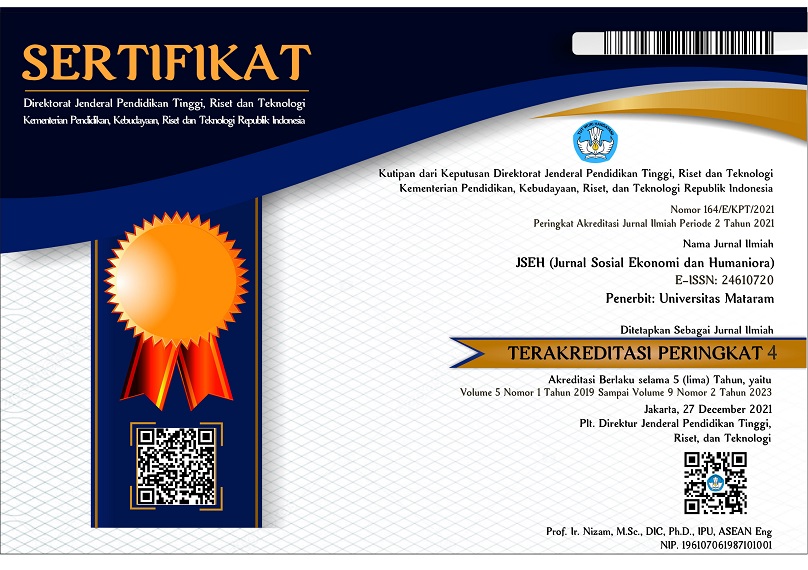Proses Pemberdayaan Ibu-Ibu Rumah Tangga oleh Bank Sampah “Kebumen Gemilang Sejahtera” di Kelurahan II Ilir Kecamatan Ilir Timur II Kota Palembang
DOI:
https://doi.org/10.29303/jseh.v10i2.530Keywords:
Waste Bank, Housewives, KGS (Kebumen Gemilang Sejahtera), EmpowermentAbstract
Women's empowerment is a good step to develop and improve women's competencies, especially for housewives. This research examines the process of community empowerment in recycled waste management in Kelurahan II Ilir, with a focus on the Kebumen Gemilang Sejahtera (KGS) Waste Bank. There are five main processes observed, namely enabling, strengthening, protecting, supporting, and maintaining which are used to create a supportive climate, increase knowledge and skills, and encourage community independence and innovation in waste management for housewives. The method used is analytic descriptive qualitative method. The qualitative research method is considered capable of describing the process of empowering housewives by the KGS Waste Bank. As a result, the community, especially housewives, managed to develop skills in waste management, become independent and innovative, and can spread their knowledge to other parties. This empowerment program has succeeded in creating a positive impact in protecting the environment and improving the welfare of the community.
References
Abdulrahman, F. (2000). Reduce, Reuse, Recycle: Alternatives for Waste Management. In NM State University.
Amasuomo, E., & Baird, J. (2016). The Concept of Waste and Waste Management. Journal of Management and Sustainability, 6(4), 88. https://doi.org/10.5539/jms.v6n4p88
Asteria, D., & Haryanto, J. T. (2021). Empowerment Key Factors in Shaping Women’s Awareness of Household Waste Management. Global Journal of Environmental Science and Management, 7(3).
Blocker, T. J., & Eckberg, D. L. (1997). Gender and Environmentalism: Results from the 1993 General Social Survey. Social Science Quarterly, 78(4).
Conlon, K., Jayasinghe, R., & Dasanayake, R. (2021). Circular Economy: Waste-to-Wealth, Jobs the Global South. Urban Studies and Planning Faculty Publications and Presentations.
DLHK Kota Palembang. (2019). Temuan Penelitian Model Penegakan Hukum dan Pengolahan Sampah oleh Dinas Lingkungan Hidup dan Kebersihan Kota. DLHK.
Ghiani, G., Laganà, D., Manni, E., Musmanno, R., & Vigo, D. (2014). Operations research in solid waste management: A survey of strategic and tactical issues. Computers & Operations Research, 44(3).
Gutberlet, J., Carenzo, S., Kain, J.-H., & Mantovani Martiniano de Azevedo, A. (2017). Waste Picker Organizations and Their Contribution to the Circular Economy: Two Case Studies from a Global South Perspective. Resources, 6(4), 52. https://doi.org/10.3390/resources6040052
Jambeck, J. R., Geyer, R., Wilcox, C., Siegler, T. R., Perryman, M., Andrady, A., Narayan, R., & Law, K. L. (2015). Plastic Waste Inputs from Land into the Ocean. Science, 347(6223).
Luke, N., & Munshi, K. (2011). Women as agents of change: Female income and mobility in India. Journal of Development Economics, 94(1).
Meng, X., Tan, X., Wang, Y., Wen, Z., Tao, Y., & Qian, Y. (2019). Investigation On Decision-making Mechanism of Residents’ Household Solid Waste Classification and Recycling Behaviors. Resources, Conservation and Recycling, 140(3).
Munawir. (2012). Pengelolaan Sampah Rumah Tangga di RT. 04 RW. 01 Cipadu Larangan Tangerang. Aliansi: Jurnal Manajemen Dan Bisnis, 7(14).
Oyegoke, B. (2020). Climate Change, Female Domestic Practices, and Environmental Education Models. Sustainability in Environment, 5(3). https://doi.org/10.22158/se.v5n3p76
Purba, F., & Maksudi, M. Y. (2020). The Effect of Cash Turnover and Accounts Receivable Turnover on Return On Asset. Indonesian College of Economics.
Schutes, A. (2019). The Beach and Beyond: Laporan Pembersihan pesisir internasional. Ocean Conservancy. https://oceanconservancy.org/blog/2019/09/04/beach-beyond-breaking-2018-international-coastal-cleanup-results/
Suharto, E. (2017). Membangun Masyarakat Memberdayakan Rakyat. Rafika Aditama.
Winarso. (2011). Dari Sampah Menjadi Upah: Inovasi Pengelolaan Sampah di Tingkat Akar Rumput Kasus Program Bank Sampah ‘Sendu’ di Kelurahan Pasar Minggu Jakarta Selatan. Jurnal Manusia Dan Lingkungan, 18(1).
Downloads
Published
How to Cite
Issue
Section
License
Copyright (c) 2024 Hamdani Sumantri, Yunindyawati Yunindyawati, Zulfikri Suleman

This work is licensed under a Creative Commons Attribution-NonCommercial 4.0 International License.








